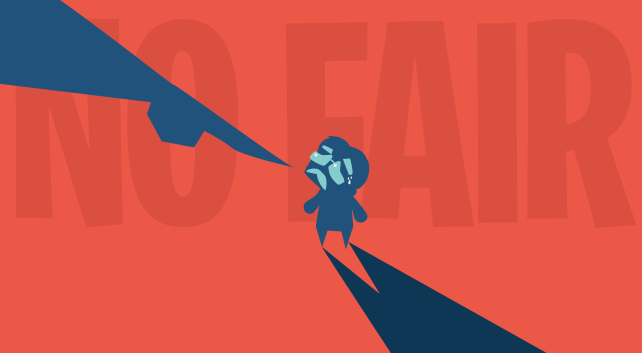- leadership
- Blog post
Why even a little bit of unfairness is a very big deal
You did a bad thing.
When a cubicle near your office came open, you gave it to the new hire instead of offering it to the person with the most seniority. Or you sent everyone on the team an email about a big new project, except you forgot to send it to Sam. Or your company has a business-casual dress code, but one person always comes in wearing faded blue jeans and you haven’t made an issue of it.
What’s the big deal?
Okay, maybe it’s not right. But it’s no big deal. Don’t we all have more important things to worry about?
You may want to start worrying. Because even though these issues seem trivial to you, they probably are a very big deal to the people who work for you.
Psychologists have found that even minor acts of perceived unfairness provoke a powerful negative response. For example, in a classic experiment known as the Ultimatum Game, people will work against their own interests to punish someone who’s acting unfairly. In the game, people are divided up into pairs. The first person is presented with a sum of money – say $10. He or she has to propose a split to the second person – for example, split it evenly; keep $9 and give the second person $1; keep $1 and give away $9; and so on.
If the second person agrees to the split, both people get their share of the money. If the second person says no, nobody gets anything.
Logically, the second person should agree to receive any amount above zero. If the first person only offers them a dollar, that’s still better than nothing.
But that’s not what happens. If the second person sees the split as unfair, they’ll reject the offer, even though they then get nothing. It seems that people will only put up with a little bit of unfairness – up to about a 60-40 split. After that they say no. They’d rather punish the other person, even at a cost to themselves.
(Research suggests, by the way, that perceptions of unfairness are asymmetrical: Not surprisingly, we’re much less concerned about unfairness when it doesn’t affect us or when we’re the beneficiaries of it. Nobody complains when they get a bigger share of the pie than everyone else.)
Why fairness matters so much
Evolutionary psychologists suggest that even a little bit of unfairness is so toxic because it’s perceived by the brain as an existential threat. The person who’s treated unfairly sees it as a signal that their status in the group is at risk. When a leader fails to “follow the rules” – whether the “rules” are formal or informal – it means that he or she is giving some people preferential treatment over others. And when survival is at stake – whether that means layoffs at the company or who gets to eat during a famine – you don’t want to be at the bottom of the pecking order.
So when employees see you acting unfairly, they can’t help themselves. Their brain sees it as a profound danger. That’s why people react so strongly even to seemingly trivial breaches. It’s why people get so upset when they see someone flouting the rules and getting away with it. Or why they feel angry if the “rules” themselves seem unfair. They can’t trust that you or the organization will stick by them when the chips are down.
Scrupulous fairness
Of course, we all break rules – or as leaders, fail to enforce them – from time to time. Sometimes we do it inadvertently. Sometimes we do it for expedience. Sometimes we just don’t care.
If you want to build trust with your people, however, you need to be exquisitely sensitive to perceived fairness. Understand both the formal and informal rules that govern the workplace. Respect them if you can. Break them if you must – but if you do, offer a sound reason for doing so: You’re putting the new hire in the cubicle near you because you need to coach him more intensively. Or if you break a rule by accident, acknowledge the mistake forthrightly: Send around a follow-up email to the entire team, explaining that you forgot to include Sam. And if you ignore rules because you don’t think they matter, change them: Update the dress code to authorize blue jeans, or at least tell your team that you’ve raised the issue with HR.

Get a demo of all our training features
Connect with an expert for a one-on-one demonstration of how BTS Total Access can help develop your team.



